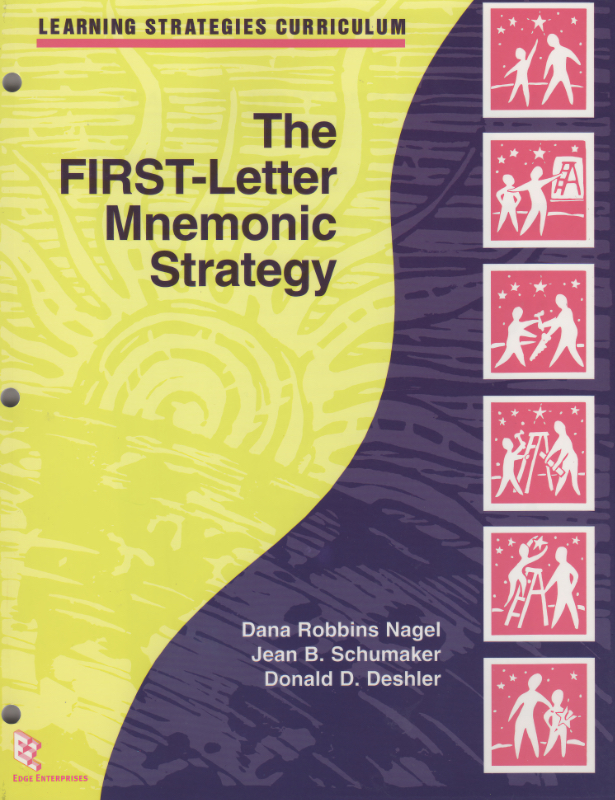The First-Letter Mnemonic Strategy

The FIRST-Letter Mnemonic Strategy is a strategy for independently studying large bodies of information that need to be mastered. Specifically, students identify lists of information that are important to learn, generate an appropriate title or label for each set of information, select a mnemonic device for each set of information, create study cards, and use the study cards to learn the information.
In studies, students who learned the FIRST-Letter Mnemonic Strategy increased their scores of test questions related to list information from an average of 51 percent before instruction to 85 percent after instruction.
Author(s): Dana Robbins Nagel, Jean B. Schumaker, and Donald D. Deshler
Publication Info: Edge Enterprises, 1986 (revised 2003)
The Story Behind the FIRST-Letter Mnemonic Strategy from author Dana Robbins Nagel:
In my earliest experiences with exceptional students, I realized that these students experienced many learning difficulties and needed strategies to facilitate their learning. I enrolled as a graduate student at the University of Kansas and met with Don Deshler, Gordon Alley, and Jean Schumaker who founded the Institute for Research in Learning Disabilities (currently known as the Center for Research on Learning). Based on my teaching experience, I knew I wanted to help secondary students retain information and enhance their learning skills. (The idea of looking at learning disabilities in adolescents was unique at that time.) These professors were developing research-based strategies to help secondary learners approach learning problems more productively and effectively, and they were creating a curriculum for the Strategic Instruction Model (SIM). Thus, we brainstormed what students really needed to know to be academically successful. We knew that in order for secondary students to be successful, they needed to be able to retain large amounts of information and demonstrate that they knew that information on tests. We conceptualized a mnemonic strategy that would provide students an organized way of independently approaching large bodies of information that needed to be mastered. After a few trials and errors, the FIRST-Letter Mnemonic Strategy was born! It was designed to help students identify lists of information, generate appropriate titles and labels for lists, select a mnemonic device for list items, and master the information in each list. Students can use this strategy effectively to learn a wide variety of information in different subject areas and dramatically improve their test scores. Additionally, this strategy can be effectively used to facilitate the mastery and recall of information in settings other than academically oriented classrooms.
Author's Thoughts about FIRST-Letter Mnemonic Strategy Instruction:
The FIRST-Letter Mnemonic Strategy can be taught to different populations and in different settings. This strategy enables individuals to utilize skills to master information that is being taught and to do this on their own. When students use the skills they have learned in a strategic manner, using the steps designed, they become independent learners. I have seen students master all parts of this strategy and generalize these skills to a variety of situations.
Teacher and Student Feedback on the FIRST-Letter Mnemonic Strategy:
Many teachers and students have told me that this is a really fun strategy to teach and to learn. They have expressed that they are able to be creative, and they have a blast making up funny, but memorable, mnemonic devices. Students report that they are encouraged by the positive results they get when taking tests and using the strategy in authentic and practical situations.
This product is available through Edge Enterprises, Inc.
Please note that professional development, coaching, and infrastructure support are essential components to effective implementation of SIM instructional tools and interventions. It is highly recommended that you work with a SIM professional developer. See the SIM Event list for sessions or email simpd@ku.edu to learn more.
An accessible version of the documents on this site will be made available upon request. Please contact the KU CRL Professional Development Research Institute, at simpd@ku.edu to request the document be made available in an accessible format.